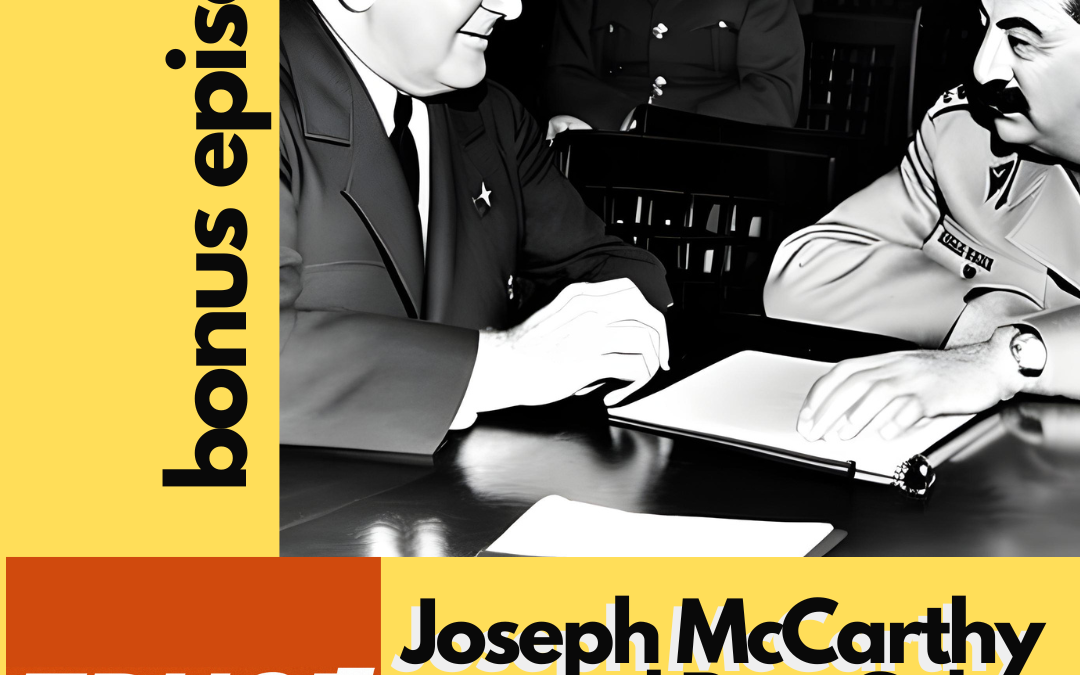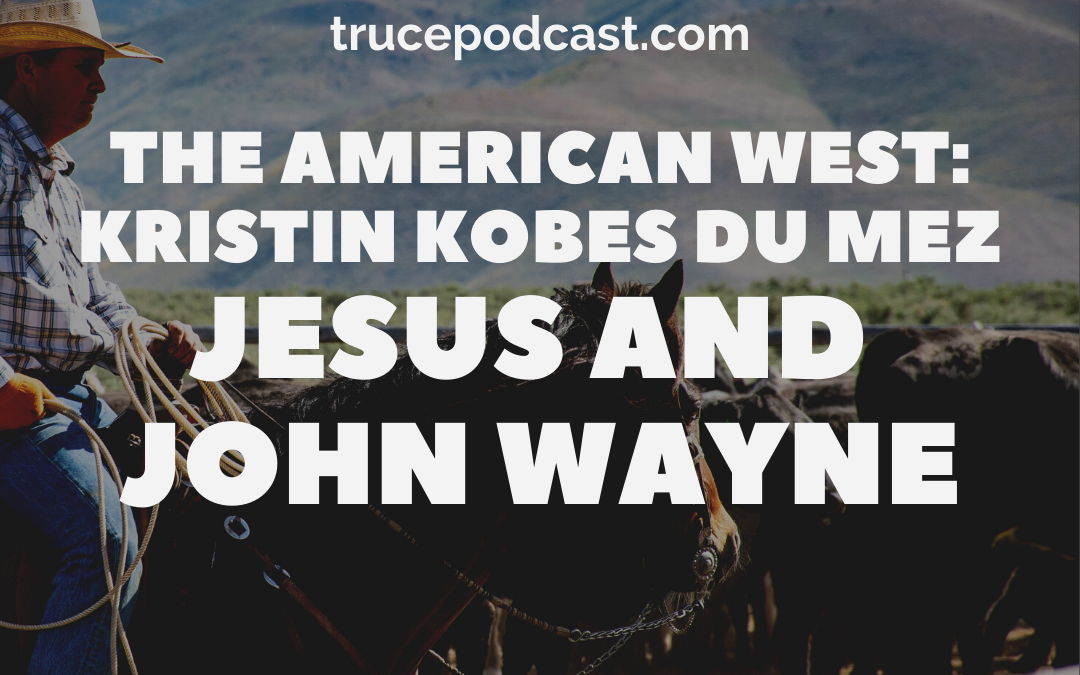
by Chris Staron | Sep 12, 2023 | Episodes
Give to help Chris make Truce!
Joseph McCarthy’s Search for Communists in the American Government
Joseph McCarthy was an unexceptional junior congressman from Wisconsin. He grew up brawling in the streets, playing cards, and embellishing his stories. Then, during a Lincoln Day address in 1950, Joseph McCarthy told an audience that he had a list of 205 communists working in the government. Within days, he was a household name.
McCarthy started “investigating” suspected communists in the American government, focusing on the US State Department. Along the way, he brought in a young lawyer named Roy Cohn. Cohn was already known for his work sending Julius and Ethel Rosenberg to the electric chair. Now, he and McCarthy bullied and cajoled during private hearings. Being labeled a communist, or even a suspected communist could ruin a person’s career. People committed suicide rather than face their scrutiny.
Roy Cohn was Donald Trump’s Mentor
Their reign lasted four years, ending in the televised broadcasts of the Army-McCarthy hearings in which a lawyer asked if McCarthy had any decency. That was pretty much it for McCarthy. But Roy Cohn went on to have a well-connected career, providing legal services for the mob and Rupert Murdoch, owner of Fox News. He also became a mentor to a young real estate mogul named Donald Trump. Famous people like Andy Warhol attended his birthday party at Studio 54. Cohn died of AIDS, something that was killing gay men rapidly in the 1980s, though he denied he ever had it.
This is the story of two men allowed to prey on the fears of the American people for their own gain. One fell hard, the other found himself fighting against his own people.
Larry Tye, author of “Demagogue”
In this episode, Chris interviews Larry Tye, author of the book “Demagogue”. He’s also the author of “Satchel: The Life and Times of an American Legend” and “Bobby Kennedy: The Making of a Liberal Icon”.
Sources:
- “Demagogue” by Larry Tye
- Helpful article about the Rosenbergs
- Article about Klaus Fuchs
- McCarthy’s speech in Wheeling, WV
- New York Times, February 23, 1954. Pages 16-17 “Transcript of General Zwicker’s Testimony Before the McCarthy Senate Subcommittee”
- Video from Army-McCarthy hearings (forward to the last 20 minutes if you want to jump to the stuff I used)
- The guest list for Roy Cohn’s birthday at Studio 54
Discussion Questions:
- Why do we love demagogues?
- Who are other demagogues in American history?
- The threat of communists in the government in the 1950s is sometimes downplayed. Do you think it was a real concern?
- McCarthy ran for Congress in an illegal way while still in the Marines. How do you feel about that?
- Roy Cohn sometimes went against his own people, claiming that gay people did not deserve equal rights. What might have been his motivation?
- Do you see any crossover between McCarthy, Cohn, and Donald Trump?
- Cohn died of AIDs in the 1980s when the disease was at its peak. Why might he have wanted to keep his illness a secret?

by Chris Staron | May 10, 2022 | Episodes
Give to help Truce. www.trucepodcast.com/donate
William Jennings Bryan was a Populist
Populism is a tricky subject. We use it these days as a slur, but populism can be a useful phenomenon. History professor and author Michael Kazin says that populism is an important tool when it comes to regulating power. In the late 1800s, railroads and banks were out of control. Industrialists like John D. Rockefeller had uninhibited control of their markets. Rockefeller believed in social Darwinism and didn’t mind using dirty tactics to undermine his competition.
The origins of the Populist Party
The Populist Party sprouted out of frustrations women had with the political machines of their day. Republicans and Democrats were not yet willing to accept women and the issues they cared about. Women were slowly becoming a force within politics, but neither party had the guts to accept them. So women and others decided to form their own party. But in the election of 1896, the Populist Party was worried about a split vote. They worried that if they were to run a candidate of their own then they might split the vote. So the Populist Party backed Democratic nominee William Jennings Bryan.
Bryan was a man of God. He quoted the Bible extensively, talked about the example of Jesus. But he was soundly defeated by the Republicans and William McKinley. He had only about 4% of the budget of his opponents. The story of Bryan is an interesting one because it contains the building blocks of fundamentalism.
Discussion Questions:
- What is a populist?
- Can you name some populists?
- What are the advantages of populism? The drawbacks?
- How are Donald Trump, Elizabeth Warren, and Bernie Sanders similar?
- William Jennings Bryan was one of the first presidential hopefuls from a major party to tour the country. How has this shaped American politics? Why do we like to see politicians in our home states?
- What do populism and fundamentalism have in common?
- Do you think that fundamentalism relies on strong figures as populism does? Why or why not?
Helpful Resources:
- “A Godly Hero” and “What It Took to Win” by Michael Kazin
- Library of Congress collection of Chautauqua materials
- Bernie Sanders Clip from C-SPAN
- Elizabeth Warren Clip from C-SPAN
- Donald Trump clip from C-SPAN
- Article about Mary Lease
- “These Truths” by Jill Lepore
- Library of Congress collection of McKinley/Bryan campaign materials. It’s worth searching the site in general for images from both of them.

by Chris Staron | Jun 8, 2021 | Episodes
How the myth of the cowboy encouraged Christians to vote for Donald Trump and changed Christian masculinity
What do you think of when you picture a cowboy? A rugged, handsome individual? A lover? Someone who doesn’t need the government’s help? Evangelicalism has long pushed this as the ideal model for the Christian man. What is the impact of that set of ideas?
John Wayne and Ronald Reagan have both become popular figures in American men’s ministries. Their names come up often, they both played cowboys in Hollywood. But they are unlikely heroes. Both men were divorced. Wayne wasn’t an evangelical, and Reagan had once been a democrat. But both men were instrumental in whipping up anti-communist sentiment in the US, building credibility with a religion focused on individualism.
You can draw a line from them straight to former president Donald J. Trump. All three had questionable public morals but were seen as strong, uncompromising figures. They are seen in many men’s books as the epitome of masculinity. That idea, though, comes in contrast with Jesus’ own words about turning the other cheek, forgiving our enemies, and loving our enemies.
In this episode, Chris talks with Kristin Kobes Du Mez, author of “Jesus and John Wayne: How Evangelicals Corrupted a Faith and Fractured a Nation“.
Discussion Questions
- What do you think of when you picture a cowboy?
- How have you heard cowboys, soldiers, and fighters discussed in evangelical circles?
- What books have you read that stressed the importance of tough men?
- What do you picture when you think of a Christian man? How has that been shaped?
- What do you picture when you think of a Christian woman? How has that been shaped?
- What is your idea of Jesus like? Is He a warrior, a gentle savior, or both?
- Can you see the link between the cowboy image and Donald Trump?

by Chris Staron | Mar 16, 2021 | Episodes
Christian Nationalism, QAnon, and conspiracy theories are in most churches. How should we react?
The January 6, 2021 riot at the US Capitol demonstrated the dangers of extreme Christian nationalism. When we allow our ideas about God and His protection to overrun the Bible, we get into serious trouble. Now, many Christians are questioning their faith. Why does the Jesus of the Bible look so different from us and our country?
In this episode, Chris discusses our strange relationship with the United States. We love it when it affirms us, but we don’t know what to do when the US behaves in an evil manner. How do we unify the Church in an era of division?
Helpful Discussion Questions:
- How have you seen the United States tied to Christianity?
- What do you think people mean when they say the US is a Christian nation?
- When have you seen the US behave in a Christian manner?
- When have you seen it wander from Christian principles?
- Do you follow the Jesus of the Sermon on the Mount, or an economic Jesus?
- How can you love people in your local church who believe different things about Jesus than you do?
Helpful links:
- You can learn more about the Virginia Law Codes in Rebecca Cox Richardson’s book “How the South Won the Civil War”.
- In the episode, I reference that the US provided rebels in Afghanistan with copies of the Koran and VHS bootlegs of the movie “Rambo”. You can learn about that in Steve Coll’s book, “Ghost Wars” pages 90 and 194-197.
- Learn about John Adam’s day of fasting
- The Treaty of Tripoli
- More about Dalton Trumbo
- “Trumbo” movie trailer

by Chris Staron | Jan 7, 2021 | Episodes
American Christians need to repent of our sins against the American people.
When I was a kid, we were playing at a friend’s house. I fell and scraped up my knee pretty badly. Dirt and rocks were in the wound. My friend’s mom was a nurse, so she got out her medical kit. She did her best to pick out what she could and then showed me her bottle of iodine. Iodine is a strong anti-microbial. Highly effective for cleaning wounds. But, like rubbing alcohol, it stings pretty bad.
Pain, she said, is not always a bad thing. Pain is what our body uses to tell us something is wrong. That we need to make a change. If your appendix hurts, it’s helpful. Because if they didn’t, you’d have no way of knowing that they were going to burst. Sometimes, we need to feel pain.
I don’t know about you, but I’m pretty raw today. I haven’t been able to focus on much. Yesterday, January 6, 2021, a mob of Trump supporters, incited by Donald Trump, stormed the Capitol building in Washington DC. It was an act of terrorism. A coup attempt on US soil. I’m angry. I’m scared. And what hurts the most is to know that evangelical Christians share the blame. We were a big part of his support base. Despite his stirring up rebellion, his lies about everything from the size of his inaugural audience to the shameful claims of a rigged election, his obvious conflicts of interest, racism, sexism, and potentially criminal dealings with Deutsche Bank, many of my people stand by his side. And there is nothing he can do to break that spell. Some Christians will support him no matter what.
I started this podcast three years ago for a lot of reasons. There is one big reason, though. I wasn’t public about it. I’ve spent a lot of hours debating whether or not I should tell you. But I started Truce because I think my people, Christians, are headed for persecution. Not because of the Bible. Not because we believe in Jesus, and the world hates Jesus. But because we’re acting like children. We worship oligarchs and their money, even though Jesus told us not to. We ignore the poor, even though Jesus commanded us to take care of them. We’ve acquired a taste for hate, even though the Bible says to love our neighbors. We’ve sought vengeance when it’s clear that vengeance belongs to the Lord.
I don’t think anyone deserves to be persecuted. Hear that. Nobody deserves persecution. But I think we’re building a pretty strong case against ourselves. Christian media will try to put a positive spin on it, say it’s not our fault. That the heathens hate Jesus. Know that this is the reason: because we turned our back on our calling in pursuit of power.
I probably wounded you in saying that. That’s okay. We’ve grown so used to thinking that we deserve a life free from pain. I want to remind you that pain is not always a bad thing. It tells us when we’re bleeding, when we’re wounded, when we’re sick. I think a lot about the Babylonian’s taking over Judah in the Old Testament. God’s people acted wickedly generation after generation. So they paid for their wickedness.
I won’t offer us comfort today. I just won’t. Because we won’t change until it hurts. Our positive and uplifting media outlets have robbed us of our ability to lament. To grieve. Yes, pray for this country. But if we stop there, we’re missing the point. We need to repent, turn from our evil ways, humbly and graciously serve others as Jesus served. Repent.
Until we do, let it hurt. Let today hurt.
God help us.





